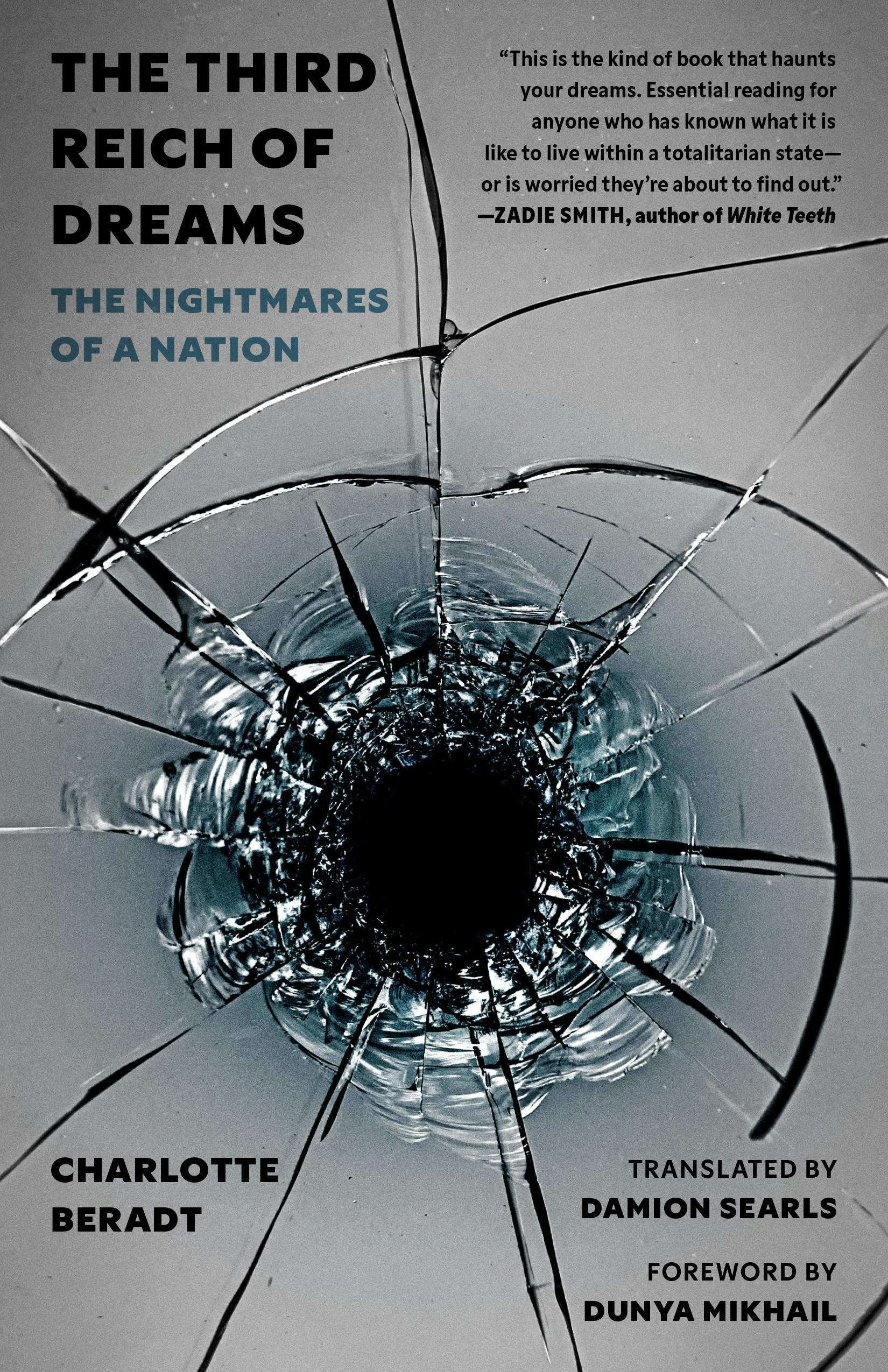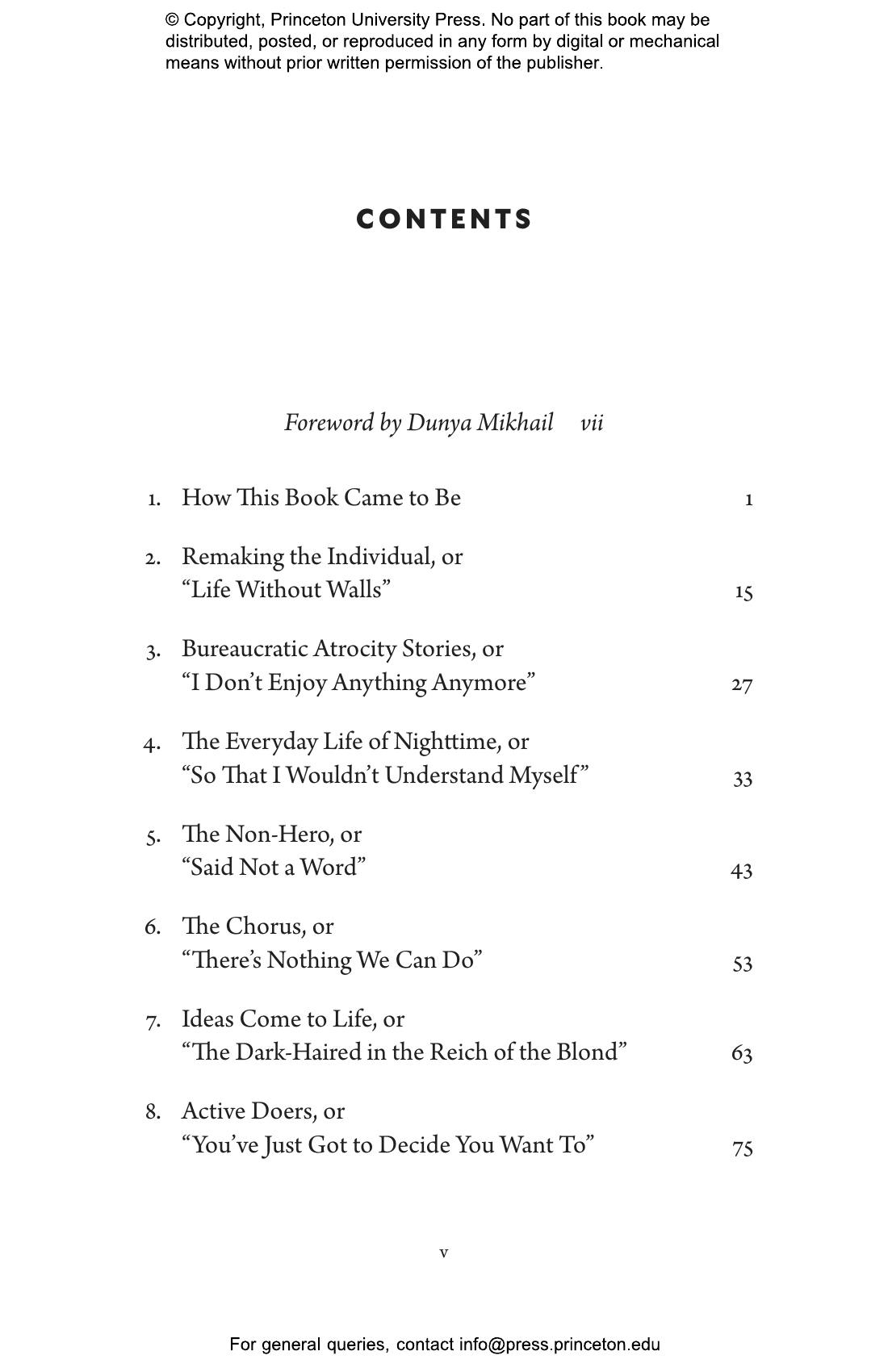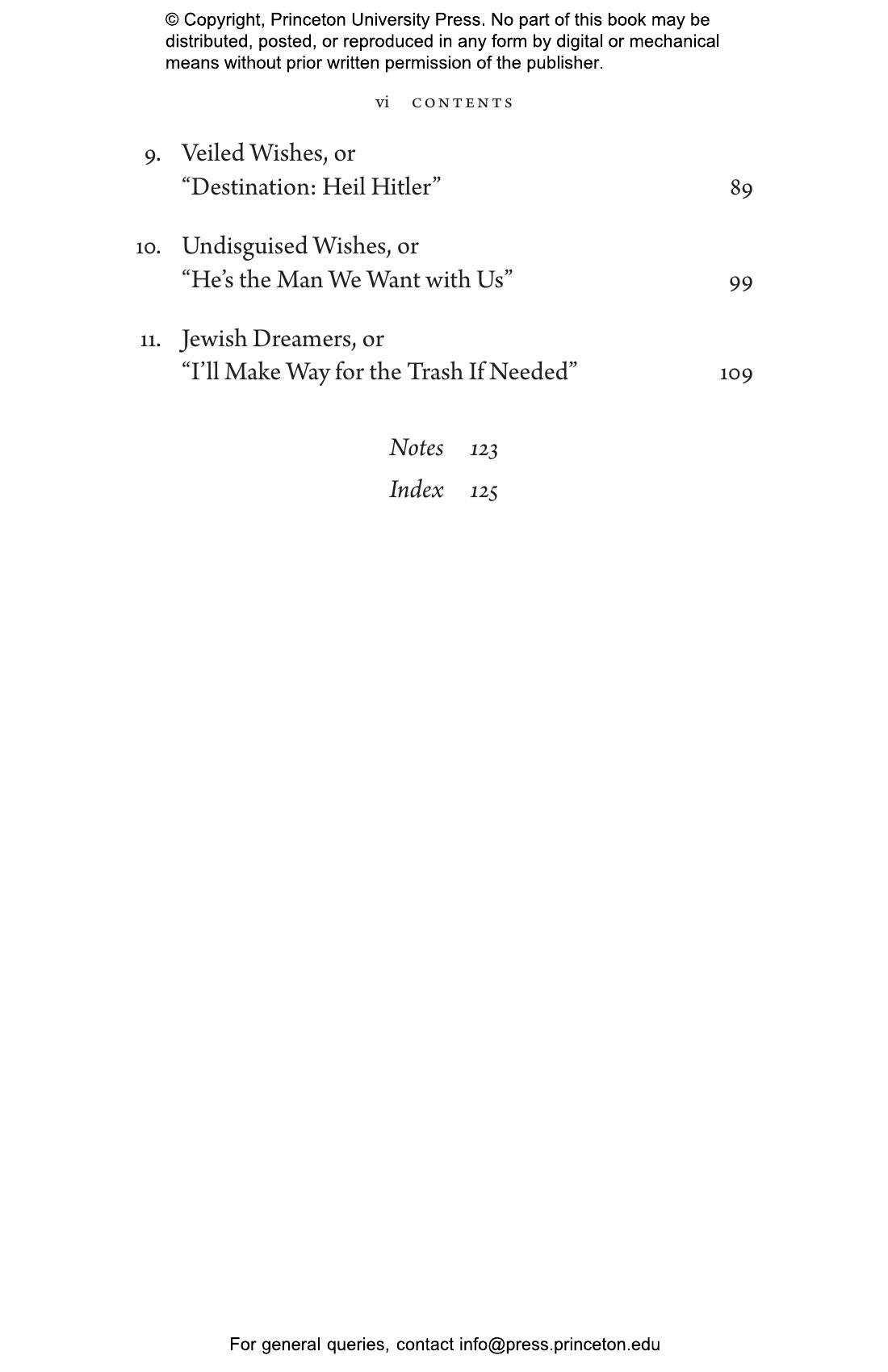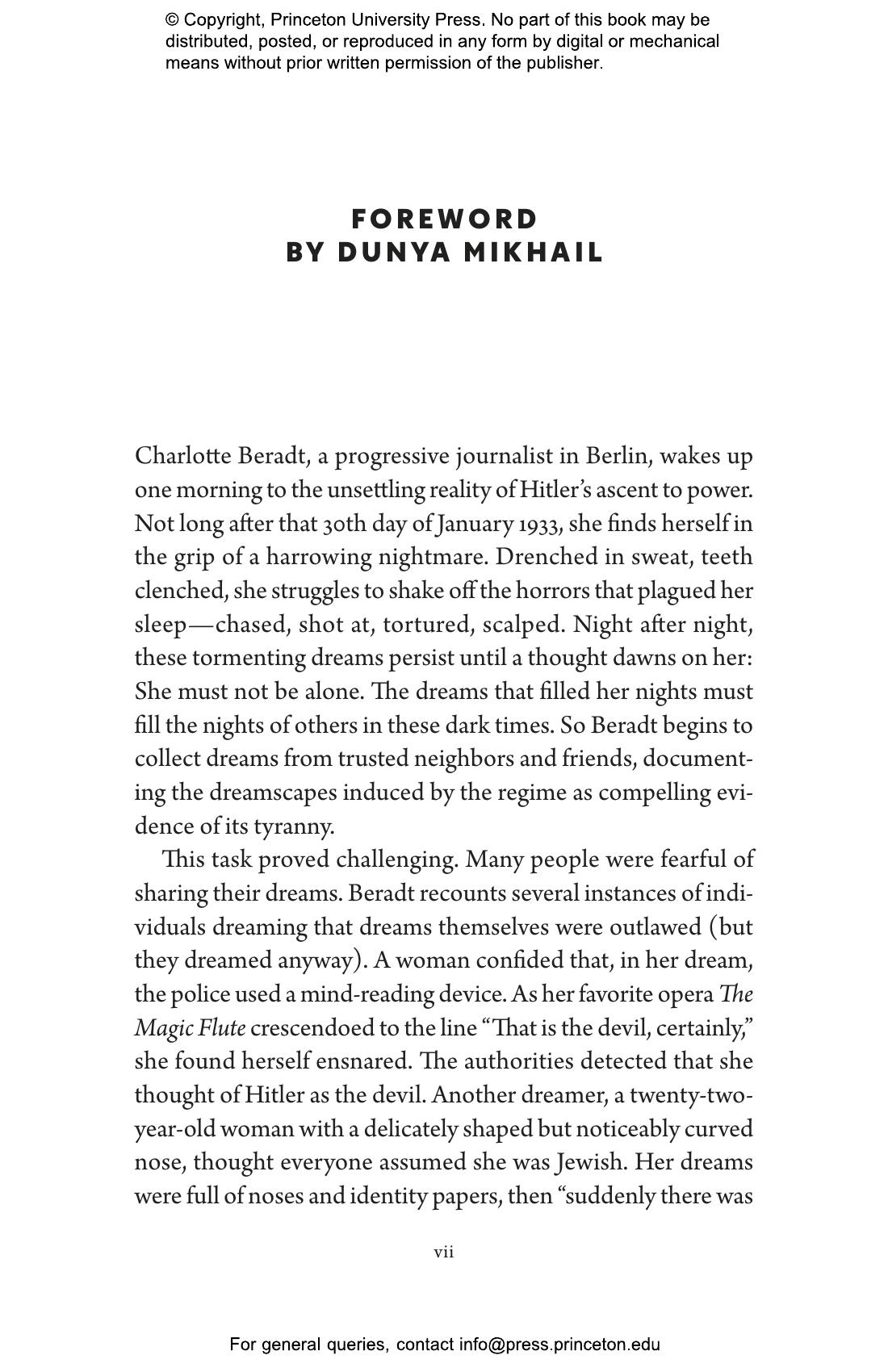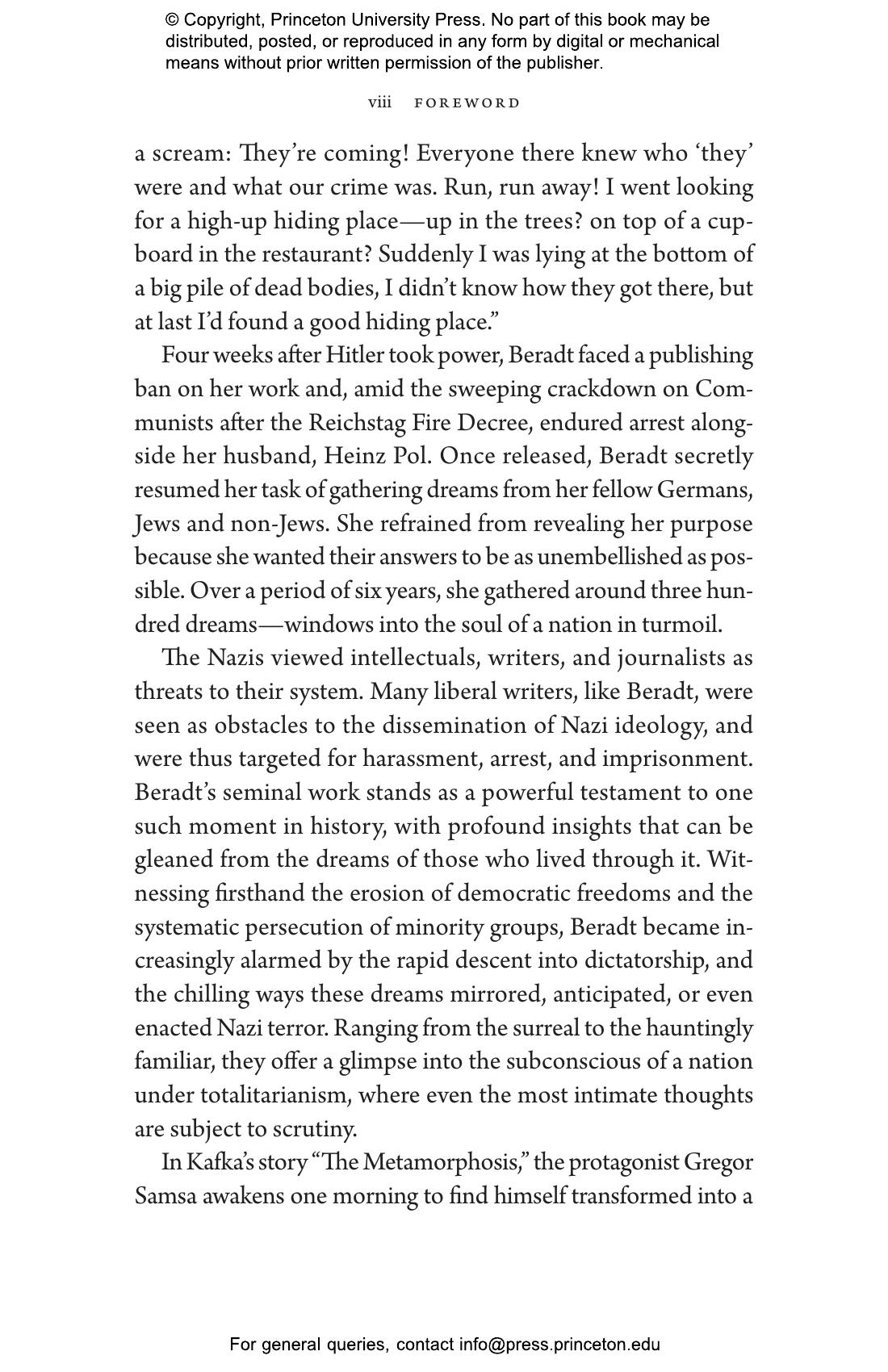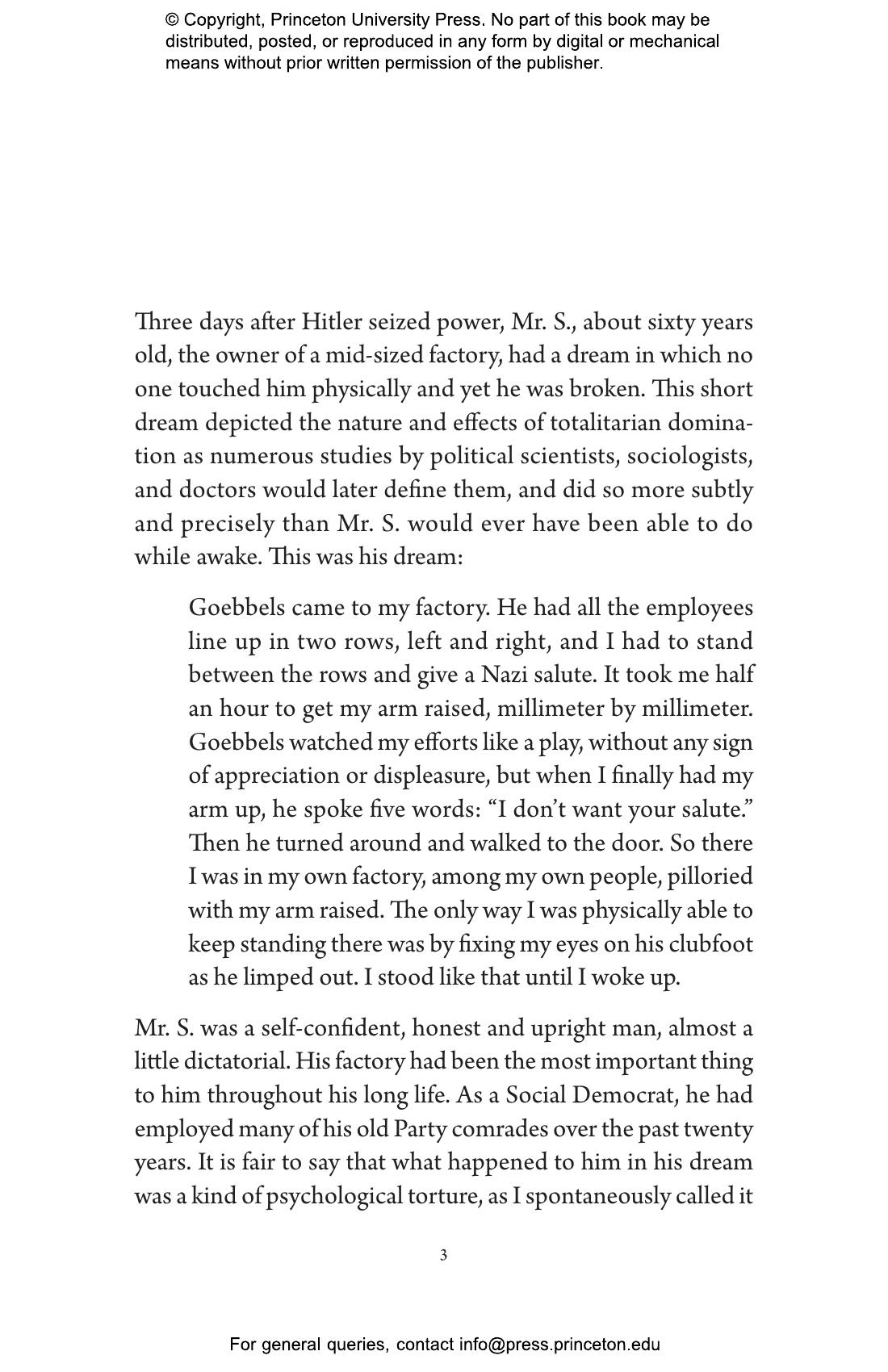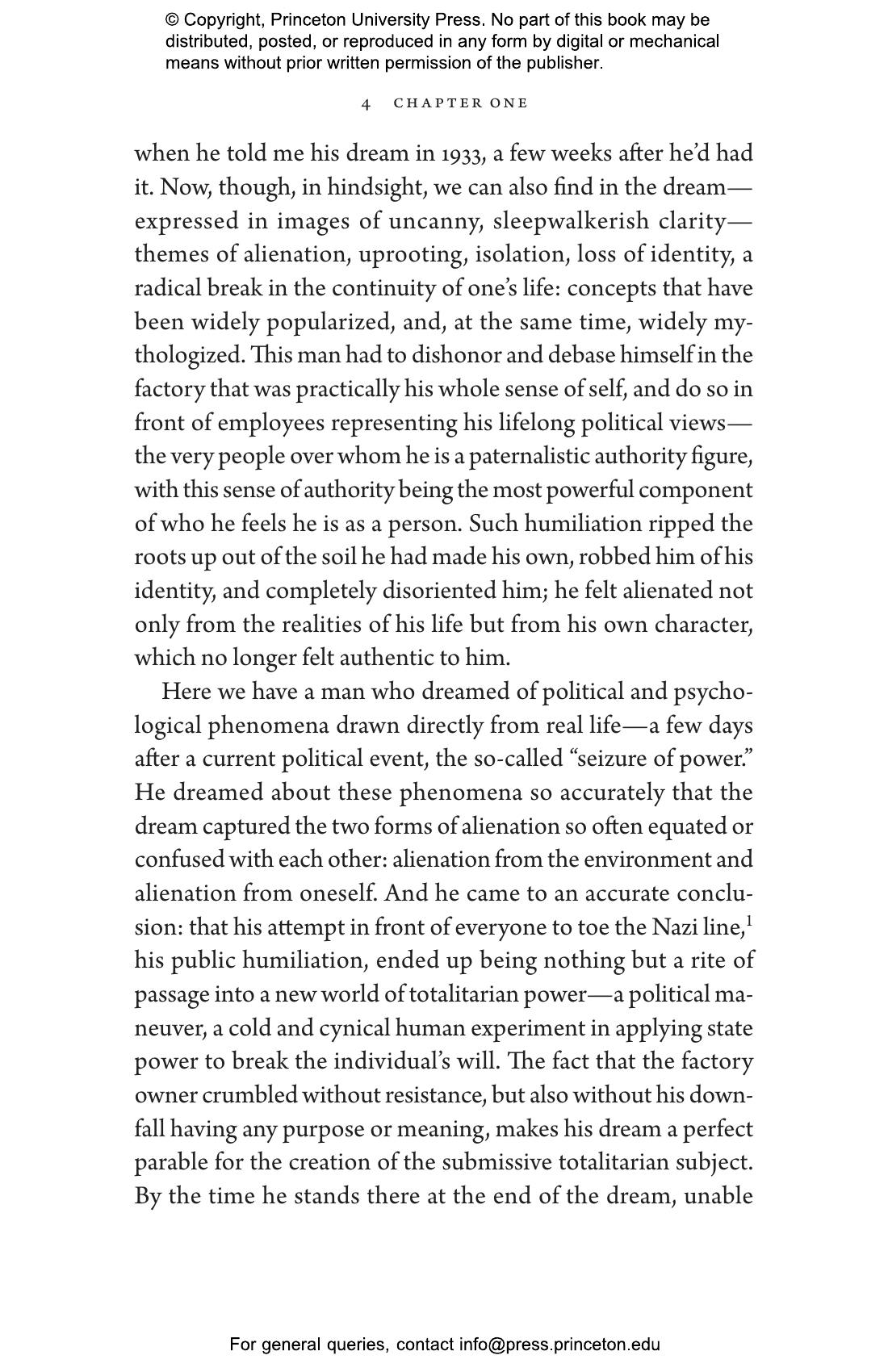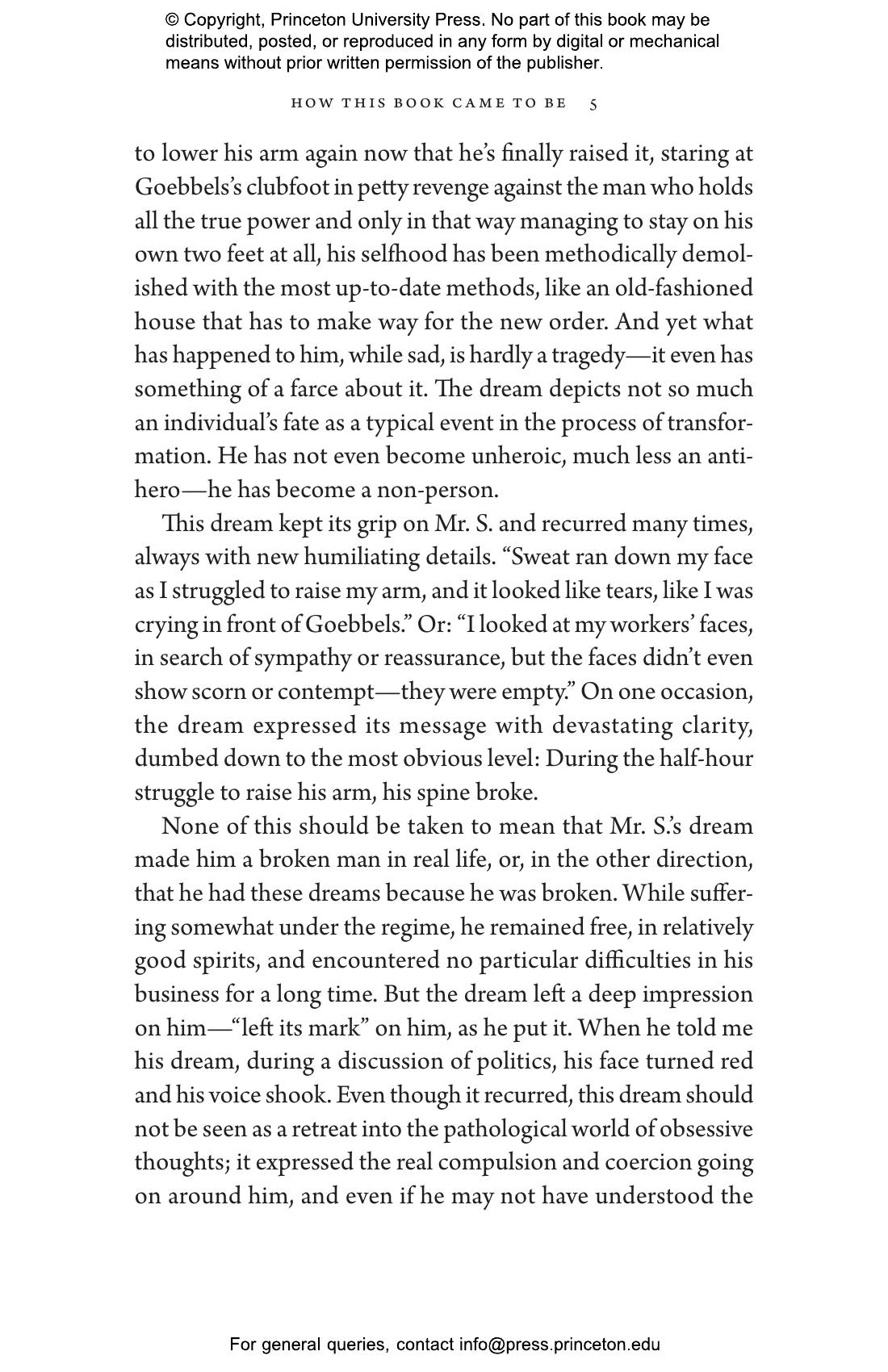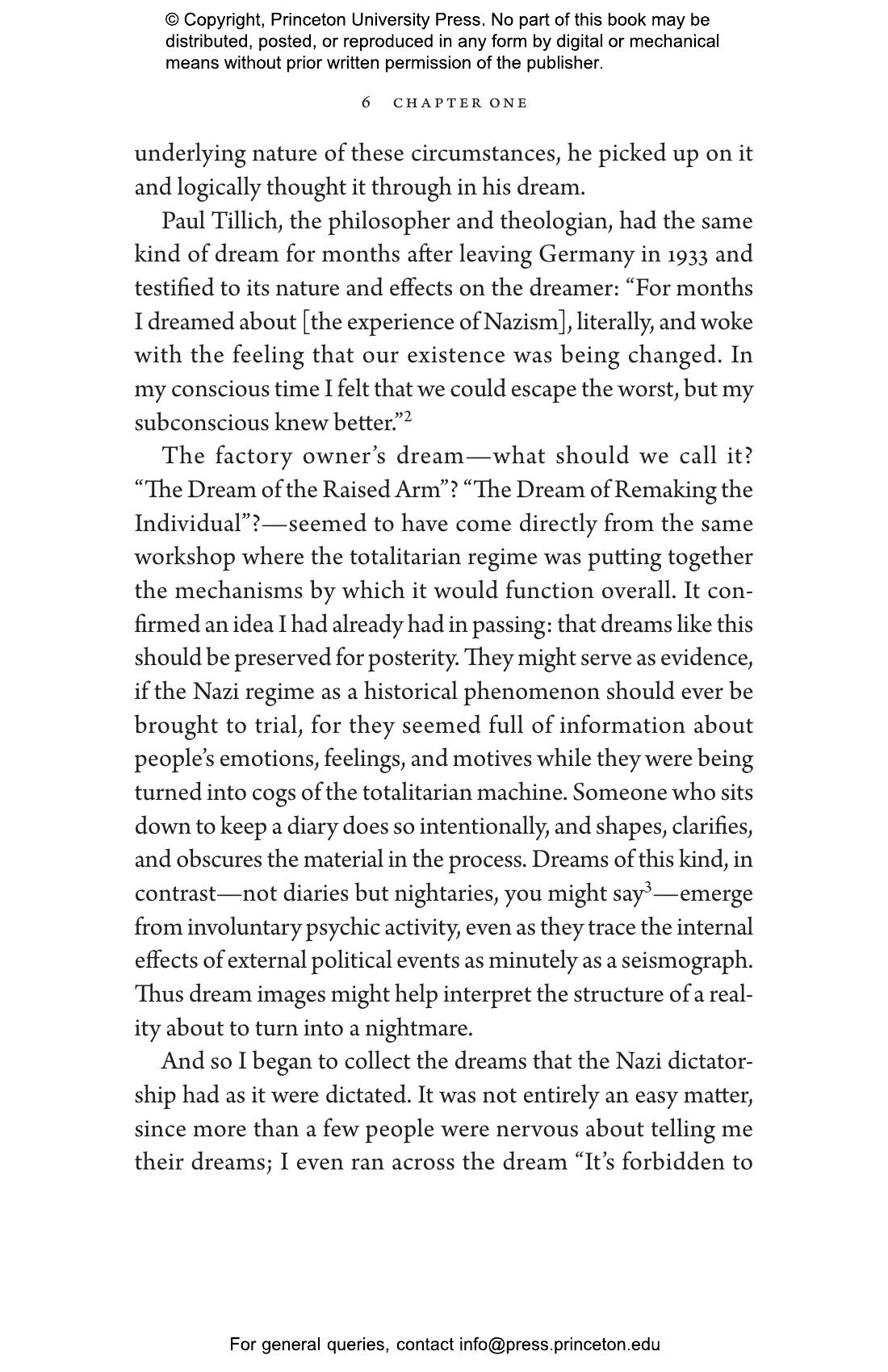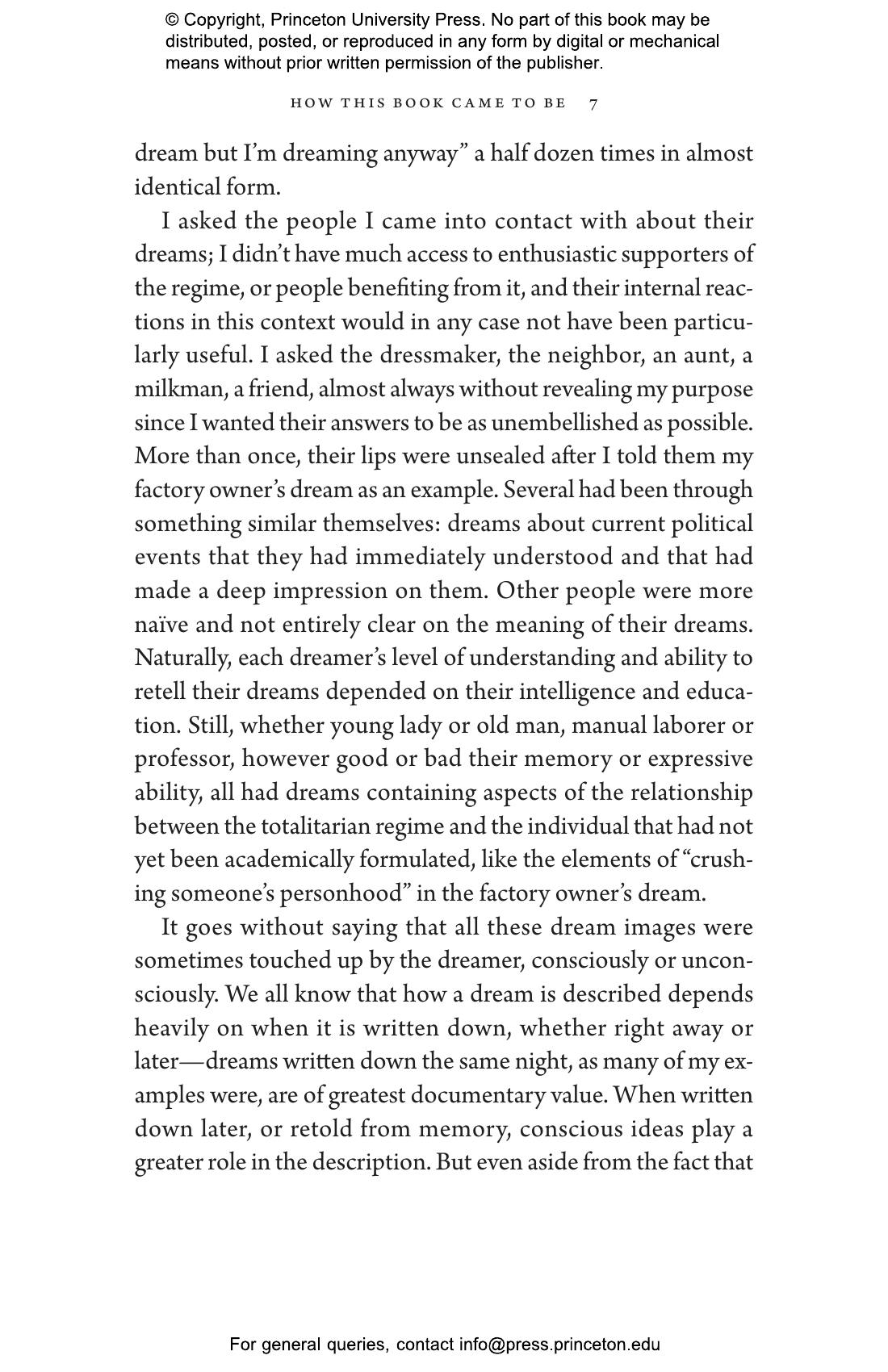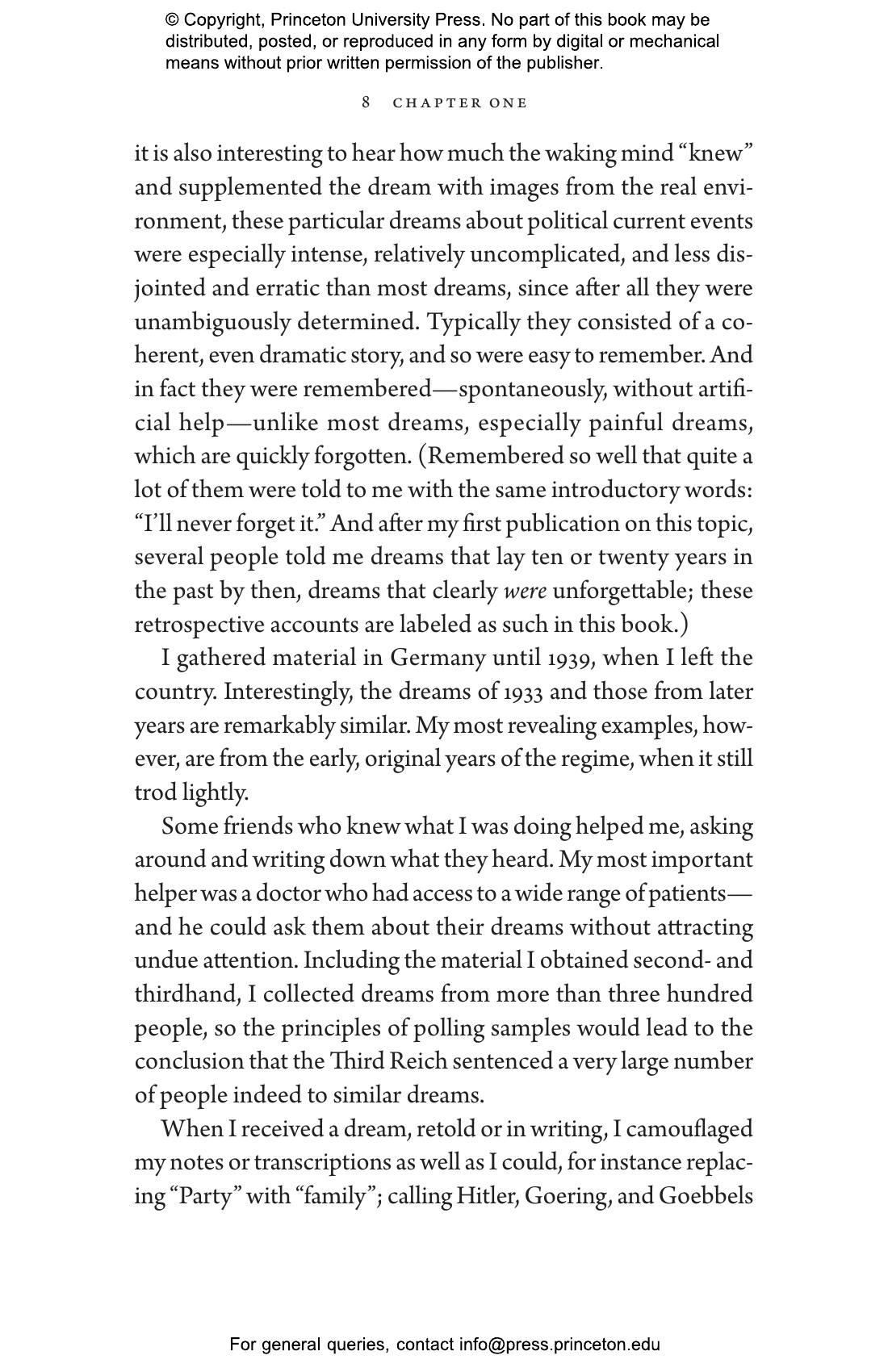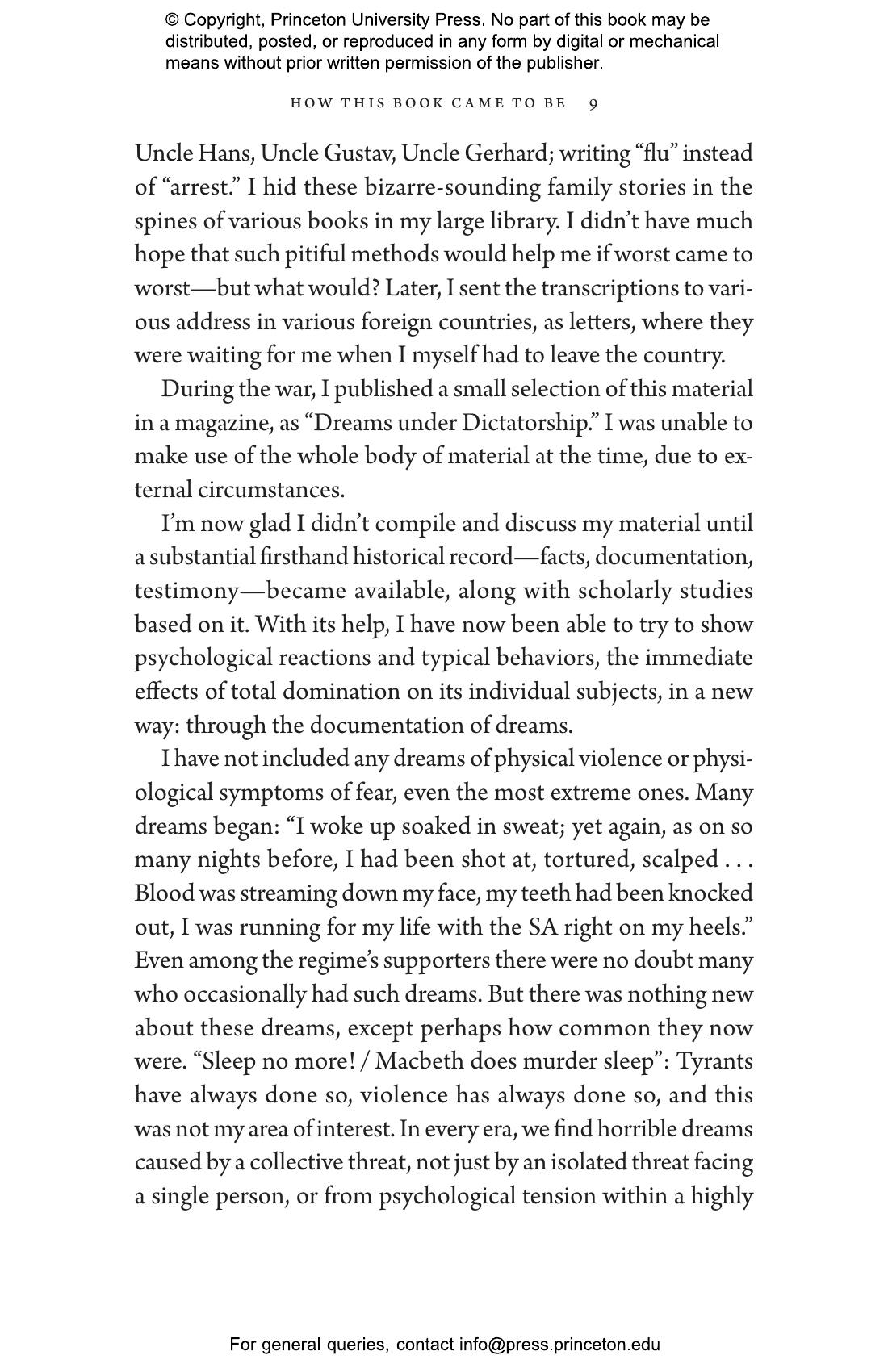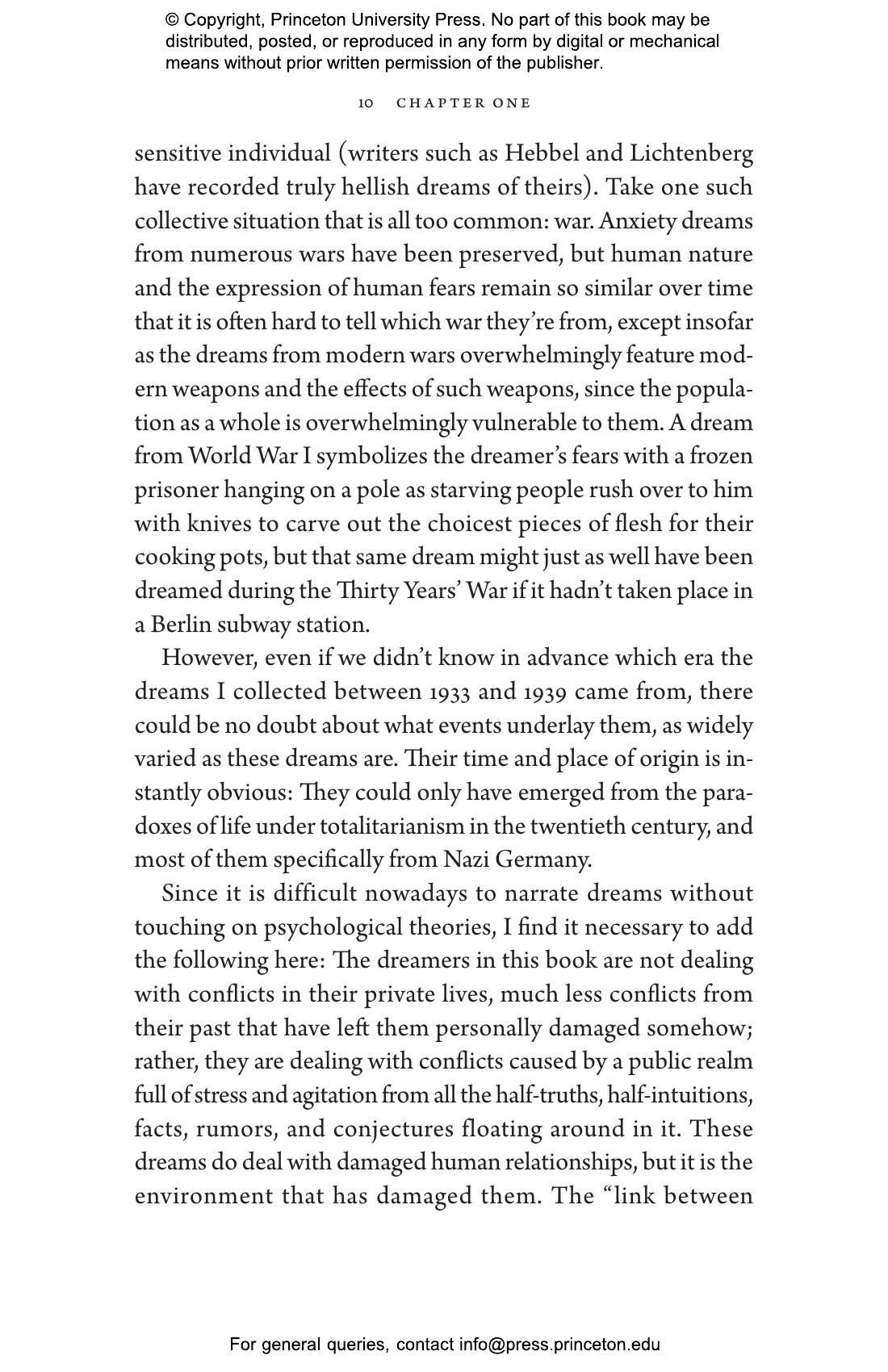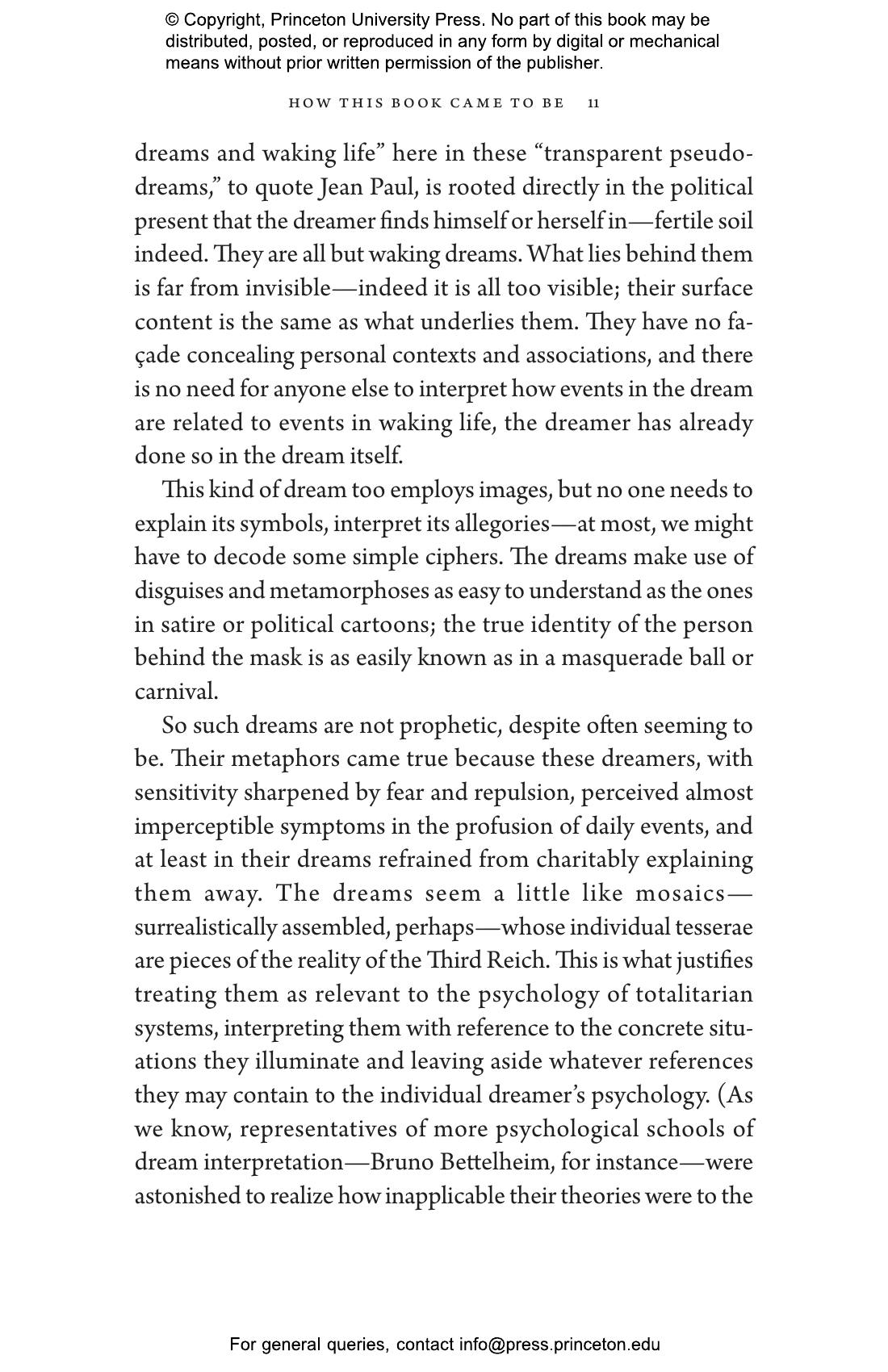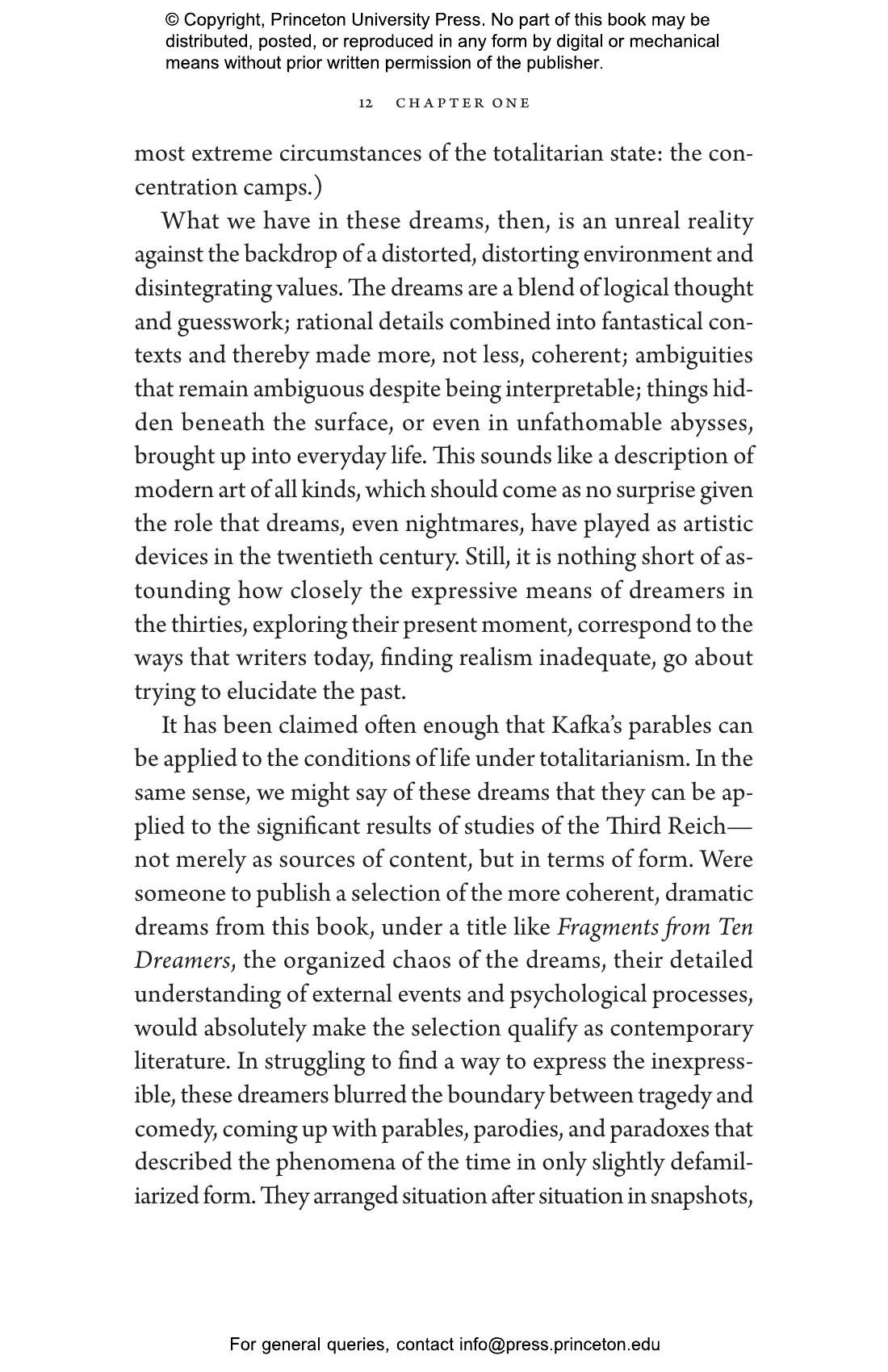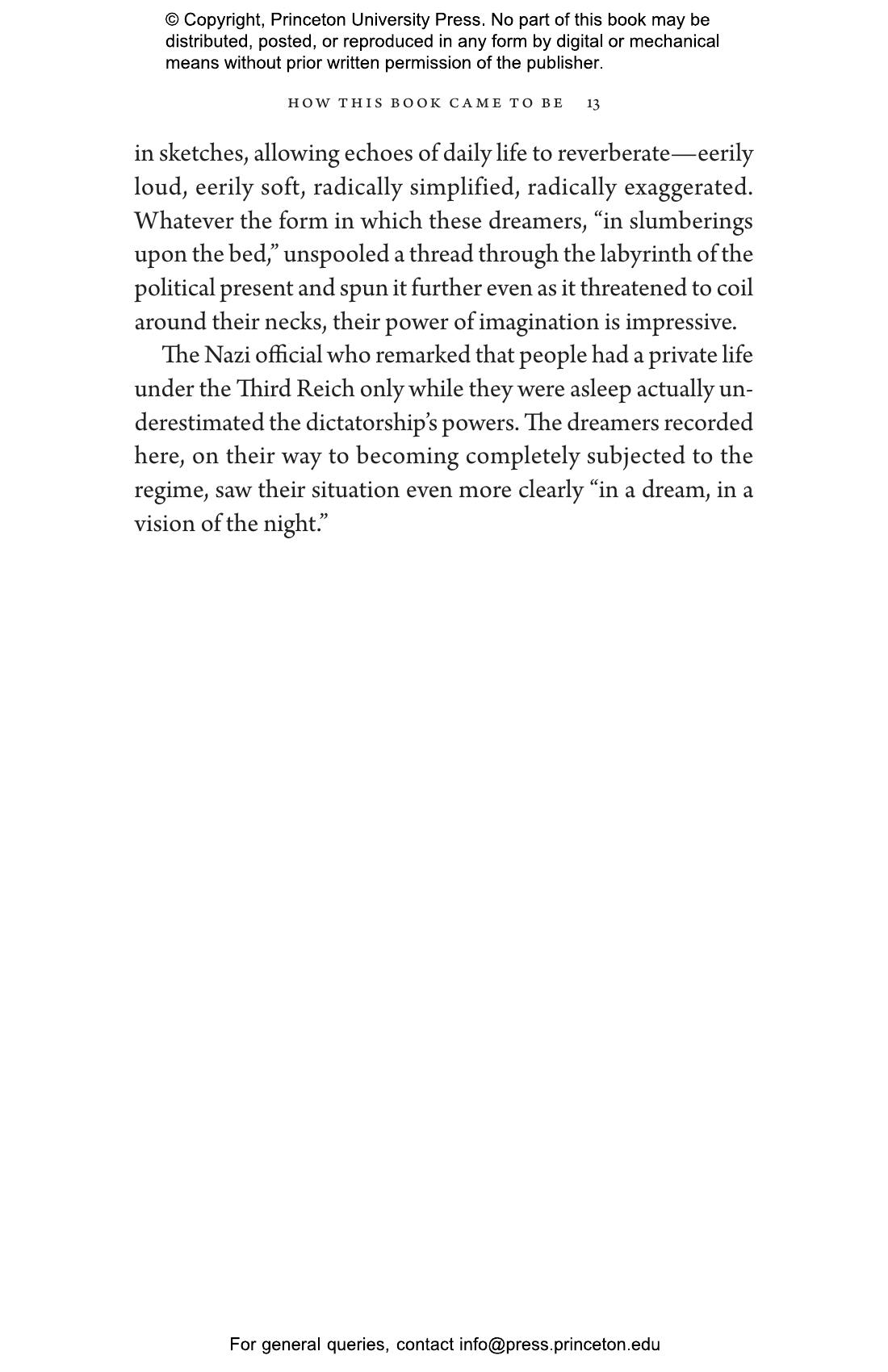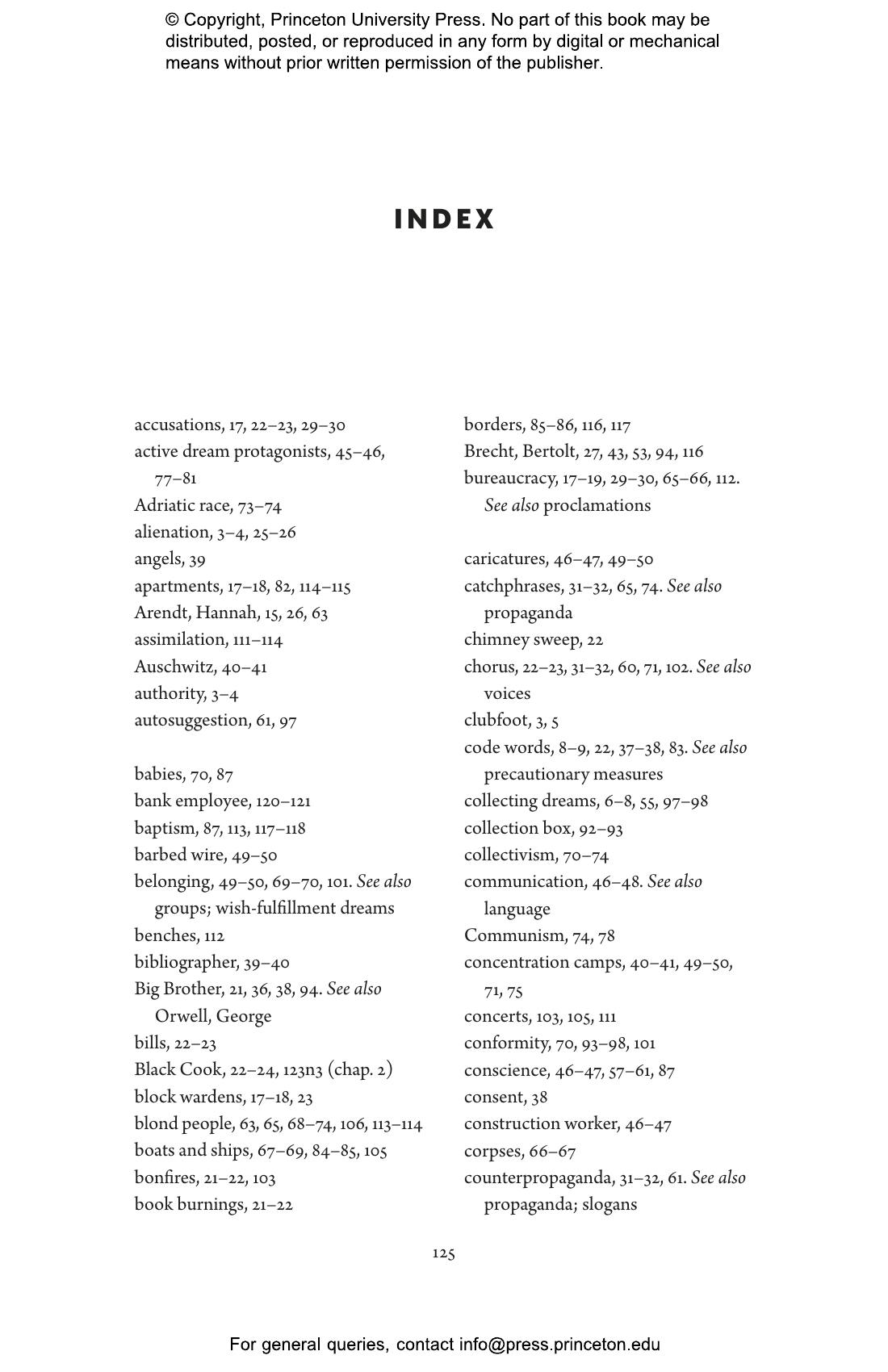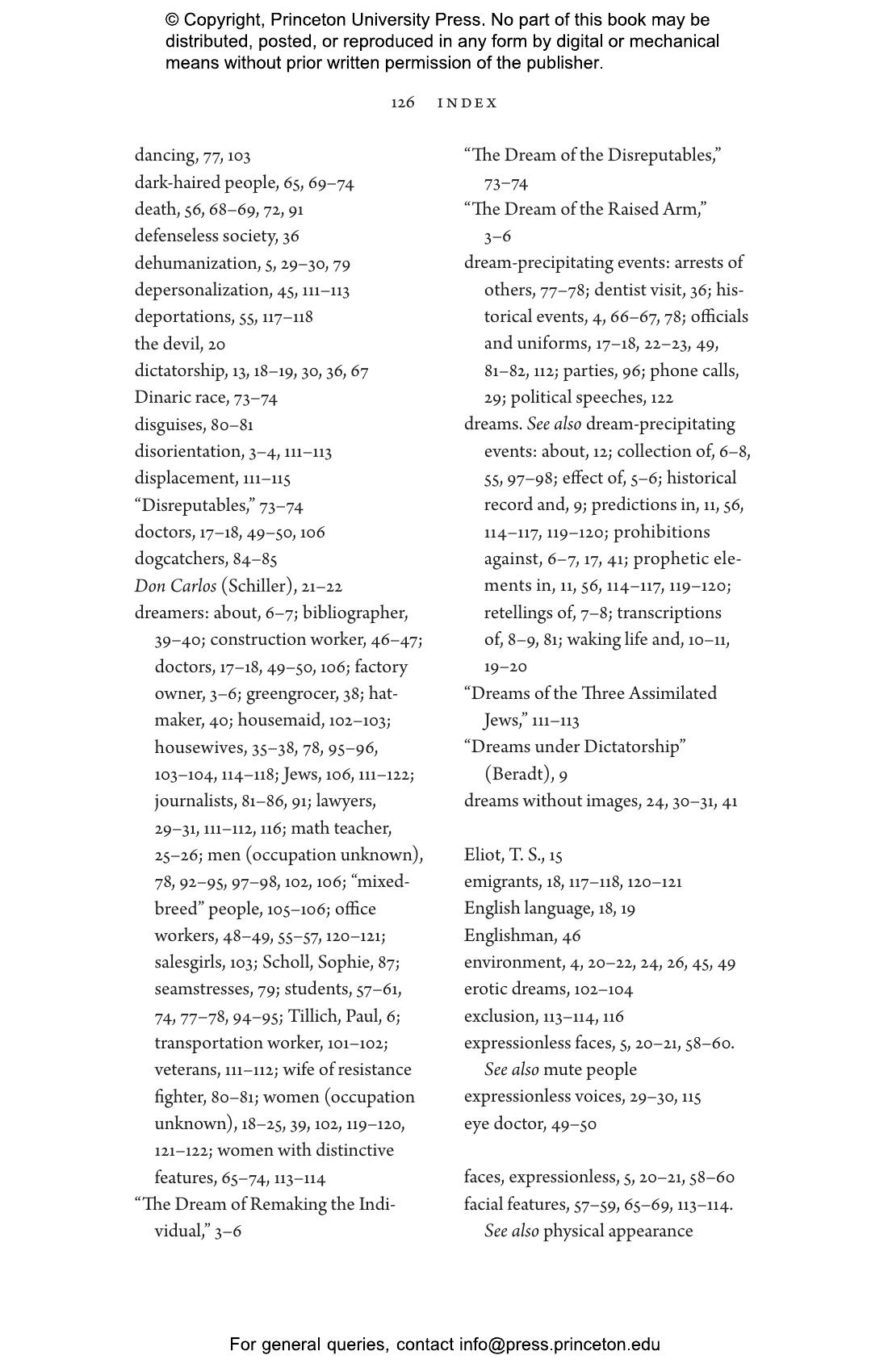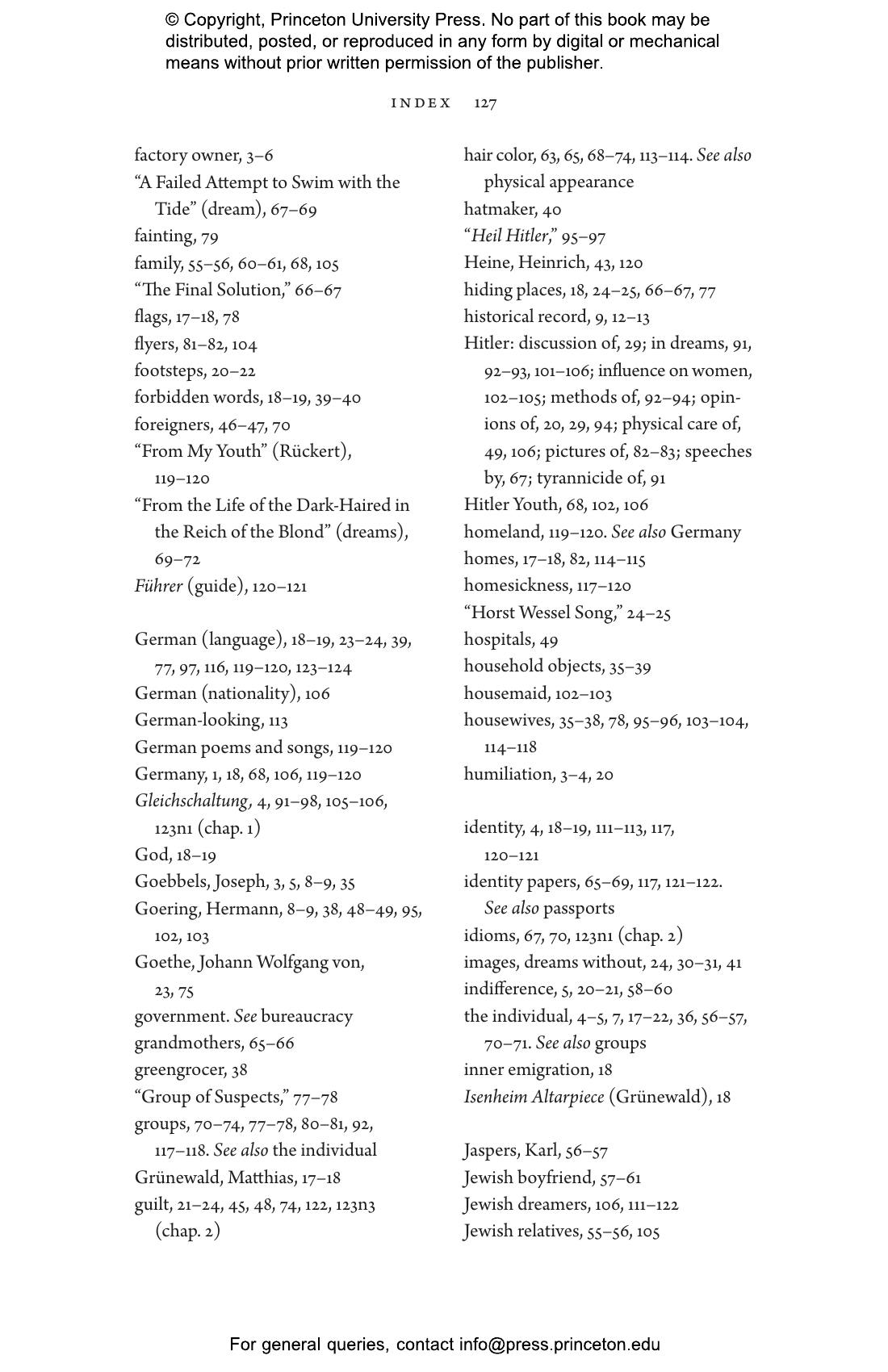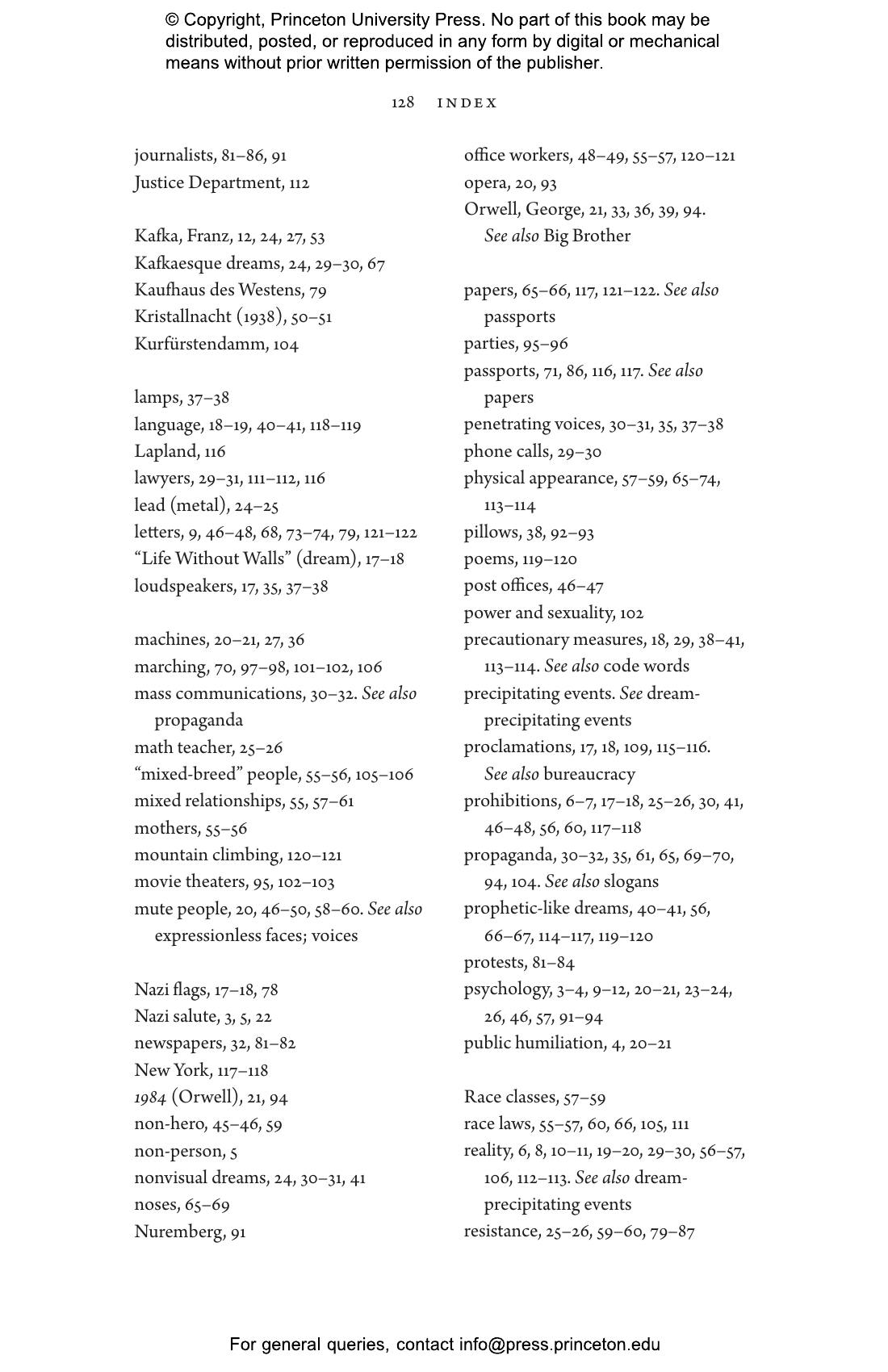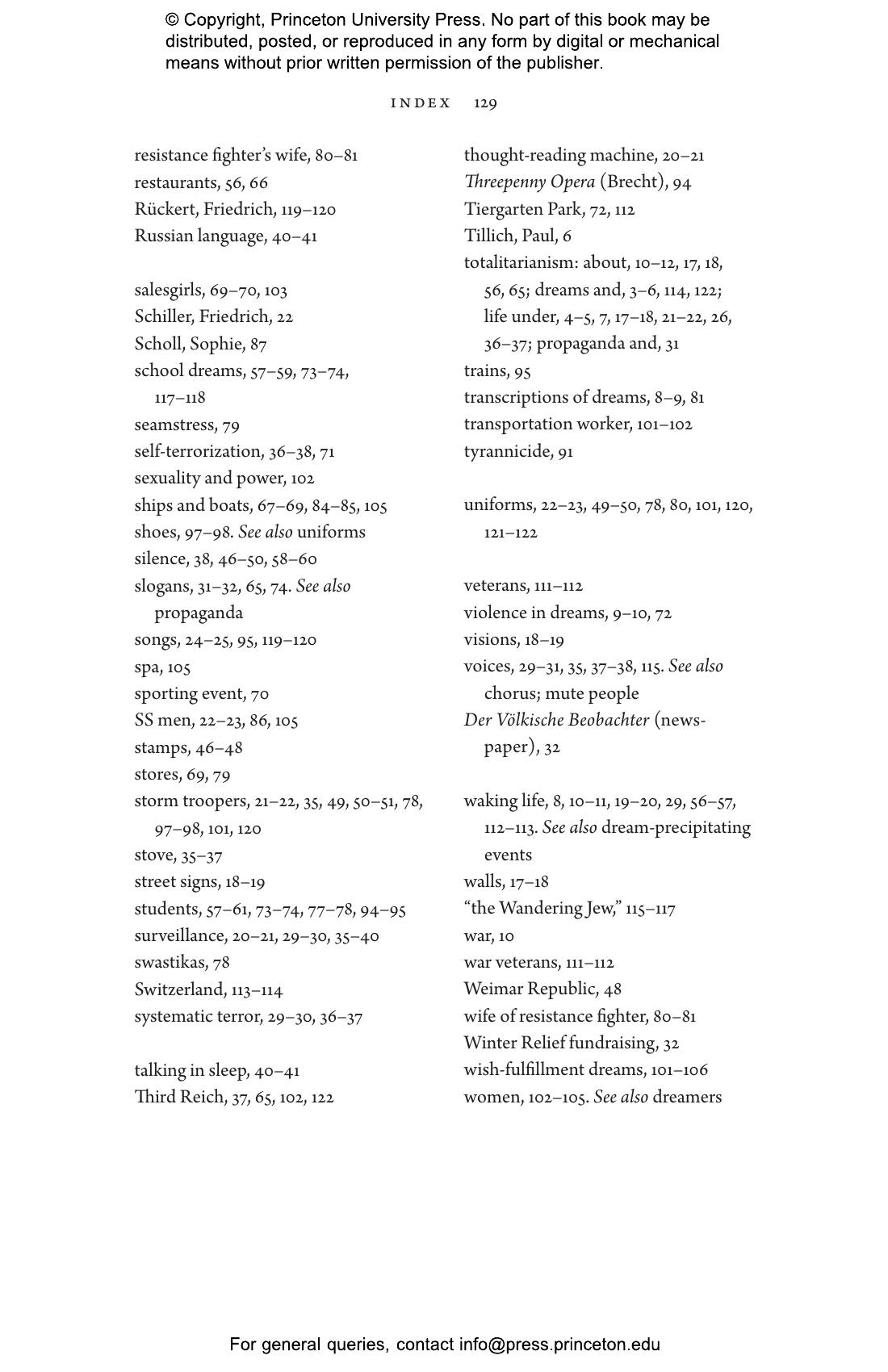Charlotte Beradt began having unsettling dreams after Adolf Hitler took power in 1933. She envisioned herself being shot at, tortured and scalped, surrounded by Nazis in disguise, and breathlessly fleeing across fields with storm troopers at her heels. Shaken by these nightmares and banned as a Jew from working, she began secretly collecting dreams from her friends and neighbors, both Jewish and non-Jewish. Disguising these “diaries of the night” in code and concealing them in the spines of books from her extensive library, she smuggled them out of the country one by one.
Available again for the first time since its publication in the 1960s, this sensational book brings together this uniquely powerful dream record, offering a visceral understanding of how terror is internalized and how propaganda colonizes the imagination. After Beradt herself fled Germany for New York, she collected these dream accounts and began to trace the common symbols and themes that appeared in the collective unconscious of a traumatized nation. The fear of dictatorship was ever-present. Dreams of thought control, even the prohibition of dreaming itself, bore witness to the collapse of outer and inner worlds.
Now in a haunting new translation by Damion Searls and with an incisive foreword by Dunya Mikhail, The Third Reich of Dreams provides a raw, unfiltered, and prophetic look inside the experience of living through Hitler’s terror.
Awards and Recognition
- One of The Economist's Best Books Published This Year So Far
"A strange, enthralling book. . . . The Third Reich of Dreams is a collective diary, a witness account hauled out of a nation’s shadows and into forensic light."—Mireille Juchau, The New Yorker
"Beradt offers us not a complex hermeneutics of totalitarianism but rather a quite straight forward picture of the psychological effects of propaganda and manipulation upon a populace. . . . How does one become a totalitarian subject? What—aside from the threat of violence—are the necessary conditions? These are questions Beradt’s dreaming people daren’t ask themselves in the cold light of day, but the queries reappear under cover of night."—Zadie Smith, New York Review of Books
"[A]n extraordinary clandestine project. . . . A new English edition, translated with crisp clarity by Damion Searls, revives this long-overlooked classic. . . . Beradt’s nocturnal diaries, vivid snapshots of collective unease, belong to a specific time and place. Her book’s involuntary testimonies are dictated, so to speak, by a particular dictatorship. But in our own moment of renewed anxiety about authoritarian impulses worldwide, they make us wonder: What happens when the dreams are no longer fully our own? The least we can do is read this singular document with our eyes wide open."—Benjamin Balint, Wall Street Journal
"Something of a cult classic. . . . [now] reissued in a crisp new translation from Damion Searls. . . . Dreams are perfect for registering nascent authoritarianism and the ways its repressions actually unfold: not as a single announcement or explosive act but as a steady, growing rumble while the ground beneath your feet begins to shift."—Gal Beckerman, The Atlantic
"Newly translated, the remarkable collection—which is unique in the canon of Holocaust literature—may now find more readers. It arrives at a time when people are more interested in the connection between sleep and well-being than ever before."—The Economist
"Beradt’s study casts an eerie, mesmeric spell. Reading it feels like scanning the dial of a shortwave radio late at night, picking up spooky transmissions from the collective unconscious of those who knew the Nazi horror firsthand."—Mark Dery, Washington Post
"Damion Searls’ new translation revives this almost forgotten but hugely insightful text."—Nilanjana Roy, Financial Times
"As remarkable as it is timely. . . . Poetic yet astute in her analysis, Beradt holds a lens up to the collective unconscious."—Eric Miles, Vanity Fair
"Haunting. . . . a concise but powerful exploration of well-trod history that feels remarkably new."—Publishers Weekly, starred review
"Even the greatest novelistic fabulists of human despair as byproduct of industrial-scale fascism could not have conceived of this book."—Literary Hub
"Beradt shows us why we should pay more heed to our inklings and sixth senses, gut feelings and nocturnal terrors."—Olivia Ward-Jackson, The Telegraph
"Beradt’s book reverberates from the past into our collective psyche. . . . 91ĚŇÉ«’s new edition provides a fresh foreword by the Iraqi journalist and poet, Dunya Mikhail, who was also a refugee, and a new translation by the award-winning translator Damion Searls. Searls walks a fine line between domesticating Beradt’s style for a contemporary Anglophone reader and maintaining the sense of the foreignness of the familiar—of the “sur-real”—in the dreams that Beradt collects. . . . Just as the dreams in Beradt’s book are remarkably prescient, already intuiting mass piles of corpses and listening devices, so too do the new edition and the eventual film land with eerie timing."—Zoe Roth, Literary Hub
"A kind of magnum opus. . . . The Third Reich of Dreams is a testament to the perceptiveness, intelligence, and creativity of ordinary people. It is also a text that is at peace with its own strangeness. Beradt demonstrates that all night, every night, we challenge and change reality. She calls upon us to cling to that strangeness so that we can continue in the work of transformation—not just unwittingly, in our sleep, but even, and more importantly, once we are awake."—Sarah Dowling, Parapraxis
"What The Third Reich of Dreams charts so precisely is the insidious intimacy with which the mind’s channels can be penetrated, a penetration that need not be conscious. . . . So many of the dreams [Beradt] relates revolve in fact around language, around statements overheard, statements prohibited, statements denied, statements revised in shame and terror—the language of dreams that if written down became instant contraband."—Geoffrey O'Brien, Book Post
"Beradt created a unique document that illustrates, profoundly, how people gird themselves, consciously and unconsciously, for the great moral tests they know are coming, even as they absorb and interpret the shocking curtailments of freedom to their daily lives. . . . I must return to Bettelheim, who raises the essential question at the end of his essay: ‘If all of us abhorred the Third Reich, why did it exist? […] Even among those who lived in fear and trembling of the Nazis, might there not have been in them somewhere, deep down, a layer of soul closely kin to that regime of terrible domination?’ The answer is being written as we reread, with fear and trembling, the work of Charlotte Beradt."—Laurie Winer, Los Angeles Review of Books
"A fascinating piece of work."—Alun David, The Jewish Chronicle
"Haunting. . . . An astonishing historical analysis, The Third Reich of Dreams speaks to the dreams of those who lived under Hitler to capture the twisted realities of Nazi rule."—Willem Marx, Foreword Reviews
"Sharply insightful. . . . This book is a timely reminder that the culture we allow ourselves to exist within is capable of making deep and damaging inroads into our collective psyche."—Salley Vickers, The Spectator
“This is the kind of book that haunts your dreams. Essential reading for anyone who has known what it is like to live within a totalitarian state—or is worried they’re about to find out.”—Zadie Smith, author of White Teeth
“At once terrifying and illuminating, Beradt’s riveting dream book takes us deep into the psychological subject under Nazism. Its republication could not be timelier. The Kafkaesque landscape that emerges is all the more frightening because it is so close not only to the ordinary experience of Nazi times but also perhaps increasingly our own.”—Lisa Appignanesi, author of Mad, Bad, and Sad
“Drawing from a collection of dreams experienced by people living under the expanding shadow of Nazi rule, Beradt reveals how terror infiltrates not just public life but the depths of the subconscious. Vividly rendered in Damion Searls’s crisp and haunting translation, The Third Reich of Dreams illuminates the profound vulnerability of life under systems of surveillance, domination, and racism. Beradt makes palpable the total domination possible under totalitarian rule.”—Roger Berkowitz, founder and academic director of the Hannah Arendt Center for Politics and Humanities at Bard College
“What happens when your dreams are no longer your own? This new translation of Charlotte Beradt’s terrifying look into the collective unconscious appears as a warning in our age of ideology, foreshadowing what happens to the inner life of a person who is forced to live under conditions of dictatorship. Fascinating and unsettling, Beradt’s collection of dreams reveals what happens when the distinction between fact and fiction ceases to exist.”—Samantha Rose Hill, author of Hannah Arendt

